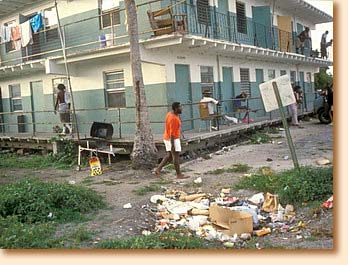| | |

Chapter 8
|
|
|
|
|
 |
 |
| | |
|
The prevalence of slave camps seems to be spreading after 2000. In North
Carolina I now find bars where "slave catchers" come to kidnap drunks and
winos for their camps.
|
| | |
|
 |
 |
| | |
|
These camps separate and destroy the black family just
as slavery has always done. Wives and children are usually not permitted in the camps.
Several men I talked to had not seen their families for up to eight months -
and were nervous about what the situation would be like when they saw them
again.
|
| | |
|
 |

|
| | |
|
In other camps families live together but are so dependent on
the children's wages that they can't afford to to let the children leave the
fields to go to school.
|
| | |
|
 |
 |
| | |
|
Although it was formally abolished in 1911, it
is a fact that the present affluence of America was built not only
on slavery and artificially low minimum wages, but also on child labor.
|
| | |
|
 |
 |
| | |
|
Even
today one fourth of America's fruit is picked by children under sixteen years
of age.
|
| | |
|
 |
 |
| | |
|
It is worth remembering as we in Europe are bombarded with
cheap American fruit products, that these are not only products of minimum
wages usually less than half ours, but also the "grapes of
wrath" of farm workers who in the off season have no social safety net like
ours.
|
| | |
|
 |
 |
| | |
|
(To give Americans an idea of what can be done to fight
poverty, let me mention the case of Denmark where unemployment benefits are 90% of normal salary for 2 1/2 years,
there is free health
care and education, rent subsidies, family allowances, nurseries,
kindergartens, etc.).
The cheap American fruit we are enjoying is virtually the product
of slavery.
|
| | |
|
 |
 |
| | |
|
By accident one day I discovered the name Coca-Cola on some of the trucks
that drive orange juice from the migrant camps to the North, and found out that
Coca-Cola, under the name of Minute Maid, owns quite a few of these slave
camps.
|
| | |
|
 |
 |
| | |
|
Coca-Cola's slave camps are probably not among the worst in
Florida, although many of the children suffer from universal
deficiency diseases such as anemia which makes them exhausted and
emaciated.
|
| | |
|
 |
 |
| | |
|
In a letter to me after my book was published Coca Cola admitted conditions were
so bad, that they would start reforms. After further protests from viewers of my show, Coca Cola
invited me down to see the change. If change did take place it shows what each of us can do to
affect it.
|
| | |
|
 |
 |
| | |
|
In my vagabond days in the South it was more crucial for me to
communicate through friendship and not incite hostility and confrontation.
|
| | |
|
 |
 |
| | |
|
I was not always successful. In Florida I stayed with a tomato grower who said that he made a
million dollars a year on migrant labor. Later he kicked me out when he
discovered my photos of what he called "niggers."
|
| | |
|
 |
 |
| | |
|
- What is your main purpose? It isn't just touring....
I wasn't born yesterday... I tell you the truth, you're from that civil rights
stuff up North...
|
| | |
|
 |
 |
|
|
|
- No, I just study agriculture for a book......I got faith in
people...
|
| | |
|
 |
 |
|
|
|
- Well, If you hang around slums, that's the kind of book you're gonna
have, ain't that right? If you stay around slummy people, that's the kind of book you'll have. It
depends on what kind of people you talk to. You say you talk to both whites and
colored?
|
| | |
|
 |
 |
|
|
|
- I trust everybody...
|
| | |
|
 |
 |
|
|
|
- Well, you'll find colored people treated better here than
anywhere in the States. They are happy!
|
| | |
|
 |
 |
|
|
|
I always tried to respect the honesty of these southern
racists, so when my tape recorder later revealed that in the heat of the
argument I had told him a lie I felt very defeated. I had at that time no idea
that my photos would one day end up in a book.
|
|
|
|
|
| | |